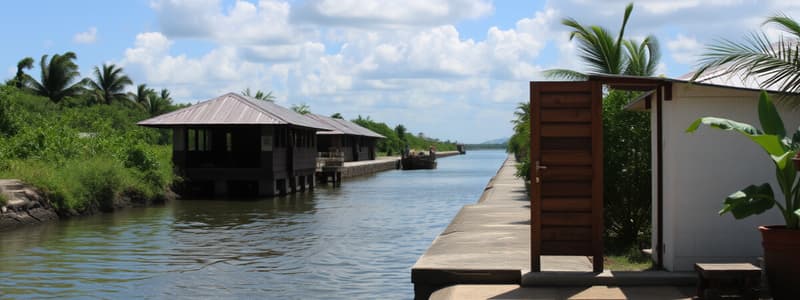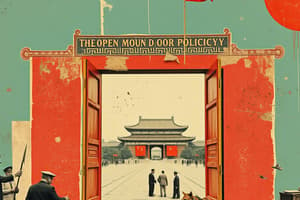Podcast
Questions and Answers
How did the Open Door policy help prevent any one nation from monopolizing trade with China?
How did the Open Door policy help prevent any one nation from monopolizing trade with China?
The Open Door policy prevented any one nation from monopolizing trade with China, allowing free trade in all of the zones of control.
What were major reasons that the United States wanted to build a canal through Central America?
What were major reasons that the United States wanted to build a canal through Central America?
The canal was a strategy to make the United States the most powerful nation on earth.
Why did the United States want to eliminate spheres of influence in China?
Why did the United States want to eliminate spheres of influence in China?
The United States wanted to eliminate spheres of influence because they didn't want to be shut out of trade in China.
Was President Roosevelt correct in his belief that a strong military presence promoted global peace?
Was President Roosevelt correct in his belief that a strong military presence promoted global peace?
How did 'moral diplomacy' shape President Wilson's foreign policy?
How did 'moral diplomacy' shape President Wilson's foreign policy?
What is dollar diplomacy?
What is dollar diplomacy?
What is the Open Door policy?
What is the Open Door policy?
What is a sphere of influence?
What is a sphere of influence?
What is a guerrilla?
What is a guerrilla?
Describe the level of autonomy that Cuba obtained after the Spanish-American War.
Describe the level of autonomy that Cuba obtained after the Spanish-American War.
Why was the United States willing to go to war with Spain over Cuba?
Why was the United States willing to go to war with Spain over Cuba?
Identify two results of the United States's intervening in the revolution in Cuba.
Identify two results of the United States's intervening in the revolution in Cuba.
How did the United States develop an overseas empire?
How did the United States develop an overseas empire?
How did the Spanish-American War alter America's foreign policy?
How did the Spanish-American War alter America's foreign policy?
How did Anglo-Saxonism help foster American imperialism?
How did Anglo-Saxonism help foster American imperialism?
List the factors that led the United States to realize an imperialist vision in the 1890s.
List the factors that led the United States to realize an imperialist vision in the 1890s.
How was the Spanish-American War different from earlier U.S. wars?
How was the Spanish-American War different from earlier U.S. wars?
Why did the United States assert itself as a world power?
Why did the United States assert itself as a world power?
Why did the United States look to the Pacific for new markets?
Why did the United States look to the Pacific for new markets?
What role did Sanford Dole play in Hawaii's annexation to the United States?
What role did Sanford Dole play in Hawaii's annexation to the United States?
Flashcards are hidden until you start studying
Study Notes
Open Door Policy
- Prevented any single nation from monopolizing trade with China, promoting free trade across all controlled zones.
United States Canal Initiative
- Aimed to strengthen U.S. power globally by constructing a canal through Central America.
Spheres of Influence in China
- U.S. sought to eliminate these spheres to ensure equal trade opportunities and access to diverse commodities in China.
Roosevelt's Military Policy
- A strong military presence did not ensure peace; often escalated tensions and conflicts with other nations.
Wilson's Moral Diplomacy
- Advocated for a peaceful foreign policy focused on promoting democracy and preventing revolutions globally.
Dollar Diplomacy
- Refers to aligning business interests with diplomatic efforts to promote U.S. interests abroad.
Sphere of Influence
- Designates a section within a country where a foreign nation holds special rights and powers, affecting local governance.
Guerrilla Warfare
- Describes armed fighters engaging in surprise attacks, often employed in resistance movements.
Post-Spanish American War Cuba
- The Platt Amendment restricted Cuba's sovereignty, allowing U.S. intervention and naval station leases, and maintaining limited autonomy.
U.S. and Spain War Over Cuba
- Driven by jingoism, yellow journalism, and incidents like the sinking of the USS Maine, the U.S. was motivated to engage in war.
Consequences of U.S. Intervention in Cuba
- Resulted in the decline of the Spanish Empire and the rise of American imperialism, with control over Guam, Puerto Rico, and the Philippines.
U.S. Overseas Empire Development
- The Philippines were annexed as a strategic move to enhance U.S. power after defeating Spain.
Changes in American Foreign Policy
- The Spanish-American War established a pattern of U.S. support for revolutions, taking over territories like Cuba and the Philippines.
Influence of Anglo-Saxonism
- This ideology spurred American imperialism, instilling a belief in cultural superiority in the late 1800s.
Factors Driving U.S. Imperialism in the 1890s
- Business interests sought new markets overseas; existing European imperialism created security concerns and a national belief in destiny to expand.
Uniqueness of the Spanish-American War
- Unlike previous conflicts, it was primarily fought in Cuba, unrelated to U.S. property disputes, and was notably brief.
U.S. Assertion as a World Power
- Cultural superiority feelings fueled the U.S. desire to establish itself as a significant global power.
Expansion into the Pacific
- Historical westward expansion prompted the U.S. to seek new markets in the Pacific region.
Sanford Dole's Role in Hawaii's Annexation
- Dole and sugar planters pressured the Hawaiian king to comply with a constitution that restricted royal power, facilitating annexation to the U.S.
Studying That Suits You
Use AI to generate personalized quizzes and flashcards to suit your learning preferences.




